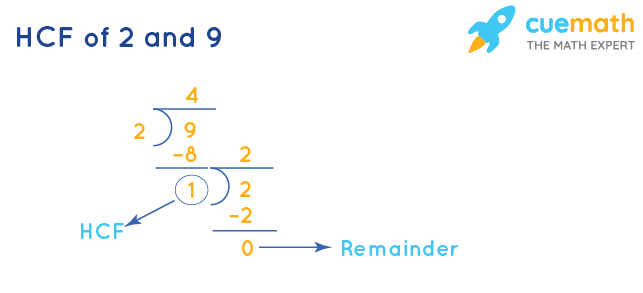HCF of 2 and 9
HCF of 2 and 9 is the largest possible number that divides 2 and 9 exactly without any remainder. The factors of 2 and 9 are 1, 2 and 1, 3, 9 respectively. There are 3 commonly used methods to find the HCF of 2 and 9 - long division, prime factorization, and Euclidean algorithm.
| 1. | HCF of 2 and 9 |
| 2. | List of Methods |
| 3. | Solved Examples |
| 4. | FAQs |
What is HCF of 2 and 9?
Answer: HCF of 2 and 9 is 1.

Explanation:
The HCF of two non-zero integers, x(2) and y(9), is the highest positive integer m(1) that divides both x(2) and y(9) without any remainder.
Methods to Find HCF of 2 and 9
Let's look at the different methods for finding the HCF of 2 and 9.
- Using Euclid's Algorithm
- Prime Factorization Method
- Long Division Method
HCF of 2 and 9 by Euclidean Algorithm
As per the Euclidean Algorithm, HCF(X, Y) = HCF(Y, X mod Y)
where X > Y and mod is the modulo operator.
Here X = 9 and Y = 2
- HCF(9, 2) = HCF(2, 9 mod 2) = HCF(2, 1)
- HCF(2, 1) = HCF(1, 2 mod 1) = HCF(1, 0)
- HCF(1, 0) = 1 (∵ HCF(X, 0) = |X|, where X ≠ 0)
Therefore, the value of HCF of 2 and 9 is 1.
HCF of 2 and 9 by Prime Factorization
Prime factorization of 2 and 9 is (2) and (3 × 3) respectively. As visible, there are no common prime factors between 2 and 9, i.e. they are co-prime. Hence, the HCF of 2 and 9 will be 1.
HCF of 2 and 9 by Long Division

HCF of 2 and 9 is the divisor that we get when the remainder becomes 0 after doing long division repeatedly.
- Step 1: Divide 9 (larger number) by 2 (smaller number).
- Step 2: Since the remainder ≠ 0, we will divide the divisor of step 1 (2) by the remainder (1).
- Step 3: Repeat this process until the remainder = 0.
The corresponding divisor (1) is the HCF of 2 and 9.
☛ Also Check:
- HCF of 5, 15 and 20 = 5
- HCF of 60 and 75 = 15
- HCF of 4 and 5 = 1
- HCF of 4052 and 12576 = 4
- HCF of 56 and 88 = 8
- HCF of 396 and 1080 = 36
- HCF of 170 and 238 = 34
HCF of 2 and 9 Examples
-
Example 1: For two numbers, HCF = 1 and LCM = 18. If one number is 2, find the other number.
Solution:
Given: HCF (z, 2) = 1 and LCM (z, 2) = 18
∵ HCF × LCM = 2 × (z)
⇒ z = (HCF × LCM)/2
⇒ z = (1 × 18)/2
⇒ z = 9
Therefore, the other number is 9. -
Example 2: The product of two numbers is 18. If their HCF is 1, what is their LCM?
Solution:
Given: HCF = 1 and product of numbers = 18
∵ LCM × HCF = product of numbers
⇒ LCM = Product/HCF = 18/1
Therefore, the LCM is 18. -
Example 3: Find the highest number that divides 2 and 9 exactly.
Solution:
The highest number that divides 2 and 9 exactly is their highest common factor, i.e. HCF of 2 and 9.
⇒ Factors of 2 and 9:- Factors of 2 = 1, 2
- Factors of 9 = 1, 3, 9
Therefore, the HCF of 2 and 9 is 1.

FAQs on HCF of 2 and 9
What is the HCF of 2 and 9?
The HCF of 2 and 9 is 1. To calculate the HCF of 2 and 9, we need to factor each number (factors of 2 = 1, 2; factors of 9 = 1, 3, 9) and choose the highest factor that exactly divides both 2 and 9, i.e., 1.
What is the Relation Between LCM and HCF of 2, 9?
The following equation can be used to express the relation between Least Common Multiple and HCF of 2 and 9, i.e. HCF × LCM = 2 × 9.
What are the Methods to Find HCF of 2 and 9?
There are three commonly used methods to find the HCF of 2 and 9.
- By Long Division
- By Euclidean Algorithm
- By Prime Factorization
How to Find the HCF of 2 and 9 by Prime Factorization?
To find the HCF of 2 and 9, we will find the prime factorization of the given numbers, i.e. 2 = 2; 9 = 3 × 3.
⇒ There is no common prime factor for 2 and 9. Hence, HCF (2, 9) = 1.
☛ What is a Prime Number?
How to Find the HCF of 2 and 9 by Long Division Method?
To find the HCF of 2, 9 using long division method, 9 is divided by 2. The corresponding divisor (1) when remainder equals 0 is taken as HCF.
If the HCF of 9 and 2 is 1, Find its LCM.
HCF(9, 2) × LCM(9, 2) = 9 × 2
Since the HCF of 9 and 2 = 1
⇒ 1 × LCM(9, 2) = 18
Therefore, LCM = 18
☛ Highest Common Factor Calculator
visual curriculum
